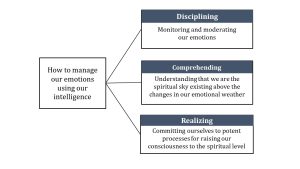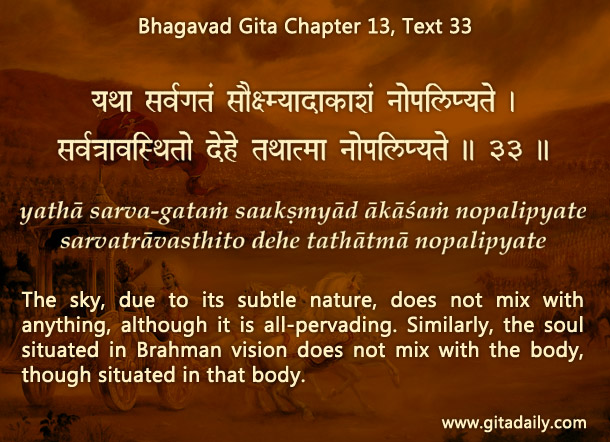 We all are prone to be swept away by our emotions, thereby acting self-destructively. How can we protect ourselves from this danger?
We all are prone to be swept away by our emotions, thereby acting self-destructively. How can we protect ourselves from this danger?
Some people try to repress or reject all emotions. But that approach will sentence us to a barren existence. Emotions enrich our life; indeed, they make life worth living. Without them, we would be little more than robots.
Gita wisdom explains that emotions are not the problem; letting them become our sole decision-maker is. How can we prevent that from happening? With a three-level approach that centers on using our intelligence:
Disciplining: We can use our intelligence to monitor and moderate our emotions — because constitutionally, the intelligence is above the mind (Bhagavad-gita 03.42). Functionally however, the mind’s emotions can sometimes be so forceful as to overpower the intelligence (02.60).
Comprehending: Therefore, we need to use our intelligence more strategically: not just to fight our emotions, but to realize our position as souls who exist above our mind with its emotions (03.43). Guiding our intelligence toward this understanding, the Gita gives a metaphor — just as the sky is unaffected by what happens in it, so is the soul proper unaffected by changes in our situations and our emotions (13.33). Thus, our wavering emotions are like weather changes. But we are not our flickering emotional weather; we are the sky within which emotional weather changes come and go.
Realizing: To go beyond philosophical comprehension to personal realization, we can use our intelligence to commit ourselves to potent spiritual processes that can raise our consciousness above our emotion-dominated mind and situate it firmly at the sky-like spiritual level. The Gita overviews various such spiritual processes — and recommends as supremely potent the process of bhakti-yoga centered on remembering the ultimate reality, Krishna (06.46-47).
One-sentence summary:
To better manage our emotions, use our intelligence to remember and realize that we are the sky within which emotions come and go.
Think it over:
- What’s wrong with rejecting or repressing emotions?
- How can we use our intelligence to deal with our emotions?
- What metaphor can help us understand our relationship with our emotions?
***
13.33: The sky, due to its subtle nature, does not mix with anything, although it is all-pervading. Similarly, the soul situated in Brahman vision does not mix with the body, though situated in that body.
To know more about this verse, please click on the image


“Functionally however, the mind’s emotions can sometimes be so forceful as to overpower the intelligence (02.60)”, I acknowledge this. In fact lately I figured out my triggers which overpower my intelligence. My triggers are disorganized and unclean surroundings especially at my home. Anyone who affects this part, I get furious not very frequently(because it is not right to be angry), but few times. In spite of knowing those triggers it is hard for me to prepare and face those triggers without becoming angry or afraid. Thank you for this wonderful article.
1>What’s wrong with rejecting or repressing emotions?
-will sentence us to a barren existence
-we would be little more than robots
2>How can we use our intelligence to deal with our emotions?
– Disciplining: We can use our intelligence to monitor and moderate our emotions. Sometimes our emotions over power our intelligence.
– Comprehending: Therefore, we need to use our intelligence more strategically: not just to fight our emotions, but to realize our position as souls who exist above our mind with its emotions (03.43).
– Realizing: To go beyond philosophical comprehension to personal realization, we can use our intelligence to commit ourselves to potent spiritual processes. Gita recommends supremely potent process of Bhakti Yoga(3.30,18.57-58)
3>What metaphor can help us understand our relationship with our emotions?
Gita gives a metaphor — just as the sky is unaffected by what happens in it, so is the soul proper unaffected by changes in our situations and our emotions (13.33).
Thanks for sharing your thoughtful answers to the reflection questions, , Vilas Manjari M. Hope you are doing well.